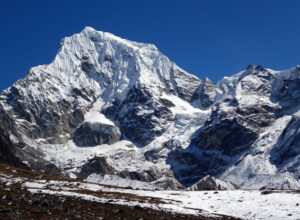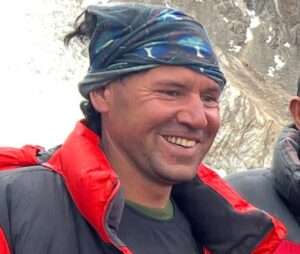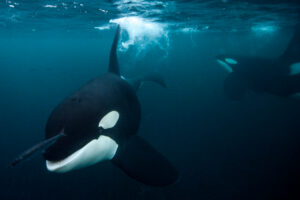During our third day in Karaganda, Dr Nurshat brings us home to meet her mother, Maya. She is the first survivor of one of Stalin´s deadly gulags that we are priviliged to interview. She greets us in the doorway and smiles welcomingly. She has one of the warmest and kindest faces I have ever come across. It amazes me, because she has survived all the trials of Stalin and much more, so I had expected to see a face pained by tragedy and sorrows. Instead I see a face of serenity and peace. How can it be?
“I grew up in the happy family” , her daughter Nurshat starts telling us whilst her mother briefly goes to check another enormous Kazakh meal cooking away in the kitchen: “My father worked in the militia, now it’s called the police. Then he worked in the local administration. My mum worked as a school teacher for 32 years. She is an Honored Teacher of the Republic of Kazakhstan. So I grew up in the big family. And due to our educated parents, we all have higher education. Our parents taught us everything and brought us up. In our family we have always kept up national traditions and rites.”
We have only known Nurshat for three days and she already feels like an old friend. She has her mothers kind face and she comes across as one of the bravest people I have ever met. She says exactly what is in her heart and is used to talking to outsiders.
“I have been interested in science since my childhood” , she continues: “And I think that interest comes from my father. He spoke Russian fluently and translated poems of Russian poets and also wrote his own poems. Apparently, that is why I chose this way of life. Thank God, I have been part of about 30 books which have been written about KARLAG and I have also written my own training manuals.”
Nurshat´s mother walks in again, sits down, interrups her daughter and says she wants to talk. Nurshat says sorry . Her mother wants to talk. She has a lot on her heart and wants to start telling her story.
“I’m Serkebaeva Mayken, Maya. I was born in 1935 in Siberia. That time was tough. Our family had been deported to Magadan and Sibria because our grandfathers, my grandfathers were rich kulaks, so my father suffered the consequences. My mother died 20 days after giving birth to me. For this reason, I was fed and taken care of by a Russian woman. We lived in Siberia all together for 5-6 years. When life got a bit better, my father wanted to come back to our motherland, Kazakhstan. At that time I was 9 months old. He put me in a duffle bag on his back. And my sister was 5 years old at that time, so he took her in his arms and walked through Russian settlements and villages. He said he walked on foot for 4 months. And after this time, he somehow caught a train, I think somewhere in Turkestan, and came back to Karaganda.”
Listening to Maya feels almost unreal to me. Suddenly I feel we are all of us in the room part of this tragic time of history. And I can see there´s intense strain in Maya´s face. I personaly feel a bothersome strain. The reason is that I have experienced a tiny little personal tragedy in my life and every time I think about it, the memory causes me pain and make my life slightly difficult for days afterwards. And I cannot even imagine the extreme pain experienced at this moment by Maya and I know it will linger for days to come. I also start thinking about a photo I saw earlier (this one above), of a group of kids who had been taken from their parents who had been found guilty under the dreaded and insane penal code called article 58 and was accused for being Traitors of the Motherland. Almost always wrongly accused. But the kids, I remember them standing there in the photo, in two rows, together with the few belongs they had, in the cold, waiting for the Soviet authorities to take them away and deprot them to their new home, a state run orphanage. And as a father who loves his daughters above everything on earth, that thought feels almost unbearable.
“When my father was walking through Russia, he found that all Russians were kind and polite.” , Maiken continues: “My father told me that once on the journey, we got invited and stayed with an old couple in their house and they bathed my sister and me. My father were given a Russian sauna, banja. They also gave him some clothes, of course they were old, but that is what we had in those days and they gave us girls some old clothes. The woman in the house took her old sheets and made us little dresses. They gave us everything they had. Like biscuits, milk and cucumbers. When they saw my father and his little daughters, they decided to help us. Russians helped us a lot.”
There is something incredibly forgiving in Mayas story. I am still deeply taken by the fact that instead of telling us about evil and profound human suffering, she tells us about people´s goodness. We have met a true saint. A unique privilege.
“When the war started my father served in a labor army in Akmolinsk for 6 months. He was training to become a soldier, but when it was found out that we were motherless, he was discharged. So we went back to Karaganda and he lived here and worked in Mine 31 until his death. He died a long time ago. But when my father returned here to karaganda, he got married a second time and we moved out to a village. I was brought up in a village. I suffered a lot since I was motherless. But my stepmother wasn’t bad. She brought us up very well.”
“When the war started, a lot of Germans were resettled and deported here to Karaganda. When they rrived, they wore torn clothes, had dirty hair and their nails were stumped. And they had lice. We gave shelter to one such German family. The father’s name was Otto Bruno and his daughter was Elza. My mother washed them. We had a few dresses, but we shared them with Elza. And we fed them. They got more than we did. They lived with us about year and a half. Elza and I slept together under the one blanket. At that time there wasn’t such things as furniture. We had only one small room and it was separated by the curtain and on one side Elza and I slept and on the other side the rest of the family slept. We lived together like a family.”
Somehow, once again I feel genuinly taken back by her story. I did not expect a survivors story in the Gulag context to be about human goodness. Maybe because everything I have read about this time of history have been based on the most tragic and negative stories of humankind. The evil side. I am sure there have been positive tales in all of what I have read, as well, but it has been overshadowed by the overwhelming dark stories told. Maya´s story almost makes me cry because it gives so much positive light of life. And, another amazing detail not mentioned by Maya, is the fact that she and her family did this even though it was considered against the law to help the deported by the authorities. But the family didn´t let this fact stop them, because they didn´t only help the German deportees.
“I think in the year of 1947 the Chechens were resettled here” , Maya continues: “We also helped a Chechen family, an old man and woman and their only daughter. They were dirty too and had only a bundle. We sheltered them in our room and as before we were only separated by the curtain. We shared our milk. We had one cow. They lived 2 years with us in the village and after this, they walked into Karaganda and found a job. There were no cars at that time.”
Maya continues:
“When my father worked in the mine together with KARLAG prisoners, there was also female prisoners doing forced labor there. Work was very tough for everyone and it was underground. My father invited them to our home. We shared our clothes and food with them. The little we had. We had almost nothing. Our father worked hard, so at times he could afford to buy us some new dresses. And we shared these with the prisoners. He worked with them for a long time.”
I stood in silence, filming, overcome by my own insignificance and selfish behaviour. On and off I asked the questions we had prepared, but most of the time Maya didn´t need any questions to tell her story.
“Whenever we came across deported people, we felt deeply for them. I felt very sorry for them. Sometimes when my stepmum went to work, I shared my bread with them. I didn’t tell my mum. That is how we lived in those days. We haven´t forgotten that time. Thank God, we were created by God. Because God gives us a happy life and today we live in peace. God created us all the same.”
Who knew saints actually existed? I think for myself. It is a quite odd experience hearing this amazing human sharing her goodness in the setting we are conducting the interview, in her comfortable house with a now full table of tasty food and we ask her, how is her life today? And how does one become such a good human being?
“I am an ordinary woman” , she answers: “I respect and love people. I love kids. No matter who you are, I want to hug and kiss you because I want to share my maternal love. I was born one way and will die the same way. I get up in the morning, kiss my grandchildren and feed them. After this I do my exercises, exactly how doctors have advise me to do. I have diabetes, so in the morning I follow a diet based on different porridges like oatmeal and boiled buckwheat, pearl barley porridge and I share this with my grandchildren. I give them milk, take the phone and call everyone I know and ask them how they are doing. Then everybody goes off to work. If everything is good, I am happy. Midday I do lunch and take a nap. In the evening I watch TV. That is how my life is like today.”
We knew through Nurshat that her mother had been a teacher, a district delegate and had been given many awards. Like the Honored Teacher of Public Education of the Kazakh SSR and Honored Teacher of Enlightenment and three years ago, Nazarbaev awarded her with a golden chain with the inscription, The Mother Heroine.
“I was a teacher and I worked very hard each day. I gave as much knowledge I could to my students, because I remembered my childhood days when I studied in the village. We didn´t have any textbooks and we wrote on a piece of tin. We had no notebooks. And we wrote on newspapers. We had very little and there was always a lack of food. And clothes. We barely survived.”
Ken has done a questionnaire based on the studies done of the survivors of the Holocaust. He is looking for common threads trying to understand the will to survive and what it takes and asks Maya about this. Her answer is a bit of a surprise:.
“God gave us strength to survive. And we should be patient, because the most important thing in life is to have patience. Allah gave us everything we need.”
Anything more you can share with us on this subject?
“Of course, during the hardest years we had torn dresses. We didn´t have any shoes. If we had any, we took turns to wear them in school. In summer we were barefoot. Well, at times up until the middle of the autumn, we walked barefoot. I am sure you know about the years of starvation we had from 1932 to 1933. That happened again in 1991 when there was a political change. But, as we learned earlier during the time of KARLAG, we learned to shared everything. For example, we used to cook kurt (drained youghurt or sour milk made into small rockhard balls) and threw them over the fence to the prisoners. We also helped the women at Steplag (a special camp which was part of KARLAG, made famous by Alexander Dolgun´s book An American In The Gulag) by rolling up bed sheets in paper and throwing them over the barbed wire to the women. Of course they didn’t have anything extra, so we washed their old clothes and threw them back over the fence. They threw us letters they wrote. That’s how it was. Of course, it was tough time.”
What about the guards, we have read they were terrible?
“There were many people from many different nations in KARLAG. Every time we had more things than we needed, my father gave it to guards and they gave everything to the prisoners. Some of those guards were very kind. They passed food and clothes to the prisoners. Because they worked together and therefore helped each others. But of course, for most prisoners life was nothing but a tragedy. They had no idea this happy life of today existed. Can you imagine if they had seen our full table now?”
We had a full traditional Kazakh meal in front of us.
“There was so much tragedy in those days. I remember that i sometimes started to cry at night, because of hat I had seen during the day. It hurt. Sometimes my father told me their stories with tears in his eyes. Of course we were kids and forgot quickly….and right now, in these days, we have everything. But what did they see of life? They don´t even have graves today where they can be remembered. Like my father’s brothers who died and they don’t have graves. My mum and brother stayed in Siberia. I don´t even know who my mother was. What could I remember after knowing her for only 20 day of my life?”
At this stage we all try to hold back our tears. Our translator Yulia cries.
“Oh, Julia is crying too” , Maya says, tears streaming down her cheeks: “Yulia, don’t cry. Why are you crying? You were born in peace. Yulia, don’t cry. When I think about my mum, I wonder who she was and I think she was probably a good person. But she doesn’t have a grave. Sometimes I think if I die, I won’t even know where my mother’s grave was. I only know that she was Kazakh.”
Maya looks at us and says:
“That is the story of my life and m y childhood. And right now I thank my children and I thank God that I am still alive and that I have everything I want right now.”
Nurshat breaks in and says:
“When my mother tells some stories, everybody starts crying. She loves all Russians because they fed her.”
Maya is silent for some time and then adds slowly:
“They brought me up and gave me back my life. That’s why I love them. Can you imagine that they fed an unknown and newly born infant? They helped us a lot. My father always told me, Maya, you shouldn’t forget that the Russians fed you and gave you a second chance to live and they shared their food with us and gave you clothes which they made from old sheets. There wasn’t any electricity in those days and they had very little themselves. They made you dresses under the light of the little lamp, he always told me and added, Maya, don´t forget!”
Ken asks Maya how does she deal with this kind of tragedy?
“I have accepted everything that has happened to me. I started my life being motherless, so I have had lots of bad things in my life. But God made me kind and gave me motivation to help and love people. God created me kind and I’ll be kind till the end of my life. If I have something to give to somebody, I do. Sometimes my neighbors ask me to lend them some money and I do. And I want to share my maternal love with everyone, no matter who. I took an oath when I was little, that whoever comes to my house, I hug and kiss them. I even hugged KARLAG’ prisoners and Chechens, everyone.”
“At times bad things happen, but I bear it. The main thing is patience. Then humanity. “
I never believed that I one day would meet a real saint and I think we all new there, life would never be the same after meeting Maya. And her daughter. And the others survivors we would soon meet.
“}






